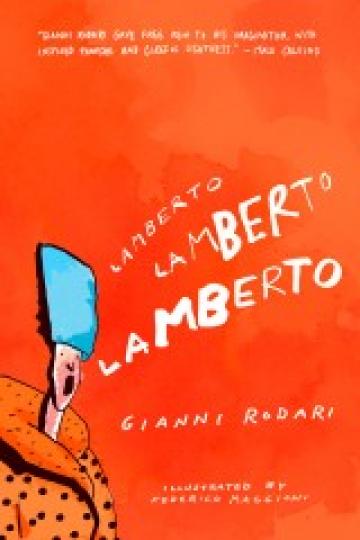LAMBERTO, LAMBERTO, LAMBERTO by Gianni Rodari
There exists an old adage, or so we're told in Gianni Rodari's Lamberto, Lamberto, Lamberto (Melville House), “that the man whose name is spoken remains alive.” Ruminations on legacy aside—and indeed, with his nimble pace, Rodari largely avoids ruminating, such that a superficial reading of the book could prove as entertaining as one spent delving for meaning—the title character, Baron Lamberto, takes the maxim quite literally.
And why wouldn't he? He is exceedingly old (94), bald, and walks propped up with canes. With this logic in mind, the Baron divines a triple-syllabic remedy for his age, staffing his attic with a team of six servants, charged with repeating his name day and night.
In time, it appears that the method is in fact a cure-all for the Baron's maladies: suddenly, his wrinkles disappear; hair sprouts on his head; he develops an unrivalled vigor for sport. There's a sense, then, that by our very reading we're complicit in Lamberto's plan for eternal youth, that with every recitation of the old man's name, part of him stays vital.
Of course, not everyone is pleased by Lamberto's sudden sprightliness, namely his feckless nephew Ottavio, who calls on his uncle mostly to check on the status of his inheritance, and, finding it far off, takes matters into his own hands. Meanwhile, a crew of bandits – themselves named Lamberto – also have the Baron's money on their minds, and descend upon the billionaire's villa and hold the town and the Baron hostage as they await ransom from the 24 banks Lamberto owns.
Penned by Rodari at the time of the Red Brigades' 1978 kidnapping and murder of former Italian Prime Minister Aldo Moro, the story's roots, and plot points, are rather grim. Yet hope and humor underscore the tale, foiling the Baron's would-be kidnappers and murderers: cases of mistaken identity abound, lost appendages regenerate, and Lamberto's liveliness is renewed several times over.
With echoes of Roald Dahl and F. Scott Fitzgerald's “The Curious Case of Benjamin Button,” Rodari spins a whimsical tale out of the uneasy tension between life and death, loyalty and betrayal, safety and terrorism. A quick, 185-page read with an agile translation by Antony Shugaar, the story is light and gleeful, the prose straightforward and amusing. And with a narrative inspired by very troubling current events, such optimism in the face of tragedy is as timely as ever—a tale of absurd triumph amid bleak headlines.
Gianni Rodari (1920 – 1980) was an Italian writer and journalist best known for his children's books. In 1970, he was awarded the Hans Christian Andersen Medal for children's literature.
Antony Shugaar is an American writer and translator. Shugaar was awarded a National Endowment for the Arts Literature Fellowship for his translation of the Italian novella Sandokan by Nanni Balestrini.

 Chelsea Allison graduated from Duke University with a BA in English and a certificate in Policy Journalism & Media Studies. After a year-long stint in investment banking, she now works in magazine publishing in New York.
Chelsea Allison graduated from Duke University with a BA in English and a certificate in Policy Journalism & Media Studies. After a year-long stint in investment banking, she now works in magazine publishing in New York.